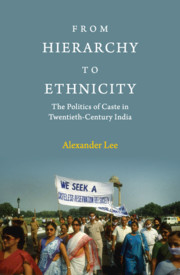Book contents
- Frontmatter
- Dedication
- Contents
- List of Tables
- List of Figures
- Acknowledgements
- 1 Introduction
- 2 Explaining Identity Activism
- 3 Caste in Historical Context
- 4 Caste in the Census of India
- 5 The Causes of Ranked Rhetoric
- 6 Caste since Independence
- 7 Conclusion
- Appendix A Data
- Appendix B Statisical Tests
- Appendix C Additional Tables and Figures
- Bibliography
- Index
7 - Conclusion
Published online by Cambridge University Press: 14 January 2020
- Frontmatter
- Dedication
- Contents
- List of Tables
- List of Figures
- Acknowledgements
- 1 Introduction
- 2 Explaining Identity Activism
- 3 Caste in Historical Context
- 4 Caste in the Census of India
- 5 The Causes of Ranked Rhetoric
- 6 Caste since Independence
- 7 Conclusion
- Appendix A Data
- Appendix B Statisical Tests
- Appendix C Additional Tables and Figures
- Bibliography
- Index
Summary
As recently as the middle twentieth century, at least a few Indians were willing to publicly argue that the caste system reflects a way of ordering human difference that was not only unchanging and unchangeable, but normatively desirable (Yogananda 2003 [1946]). At the same time, many colonial officials were willing to adopt the slightly more limited position that caste represented an ancient and fundamental aspect of Indian civilization, and that caste divisions were similarly ancient and important. Today, given the broader rise of constructivist theories of ethnicity, in the social sciences, such ideas seem almost quaint. Virtually nobody would contest that the politics of social identities in general and caste in particular have changed over time.
Twentieth-century India was a society undergoing a set of political changes – from an authoritarian colonial state to a democracy, and from a society where peasant agriculture was the dominant economic activity to one where urban centres are important and many individuals are educated. We have seen how these changes were reflected in the politics of caste. During this period, caste activists successfully politicized the identity of many caste groups, beginning with a few wealthy groups in the more educationally advanced areas of the country and expanding to include even the most ‘backward’ groups in the northern states. At the same time, the rise of democratic institutions and mass politics led to a change in the nature of caste identities, with concepts of caste that emphasized social ranking giving way to those that envisioned caste groups as discrete, bounded, and conceptually autonomous, very much like the ethnic and racial groups that were emerging in other parts of the world in the same period.
It is worth questioning whether this story has any relevance for Indian politics today, or for the study of identity as a whole. After all, if India ended up looking fairly similar to ‘normal’ identity systems in other parts of the world, what does it matter if its path getting there was long and complicated? Conversely, certain aspects of the Indian experience seem so unique and case-specific that the general applicability of the Indian case might seem questionable.
This chapter answers these questions by discussing the long-term significance of both uneven caste mobilization and ranked caste rhetoric for India today. The first section summarizes the findings on how and why caste identities changed during the twentieth century.
- Type
- Chapter
- Information
- From Hierarchy to EthnicityThe Politics of Caste in Twentieth-Century India, pp. 169 - 184Publisher: Cambridge University PressPrint publication year: 2020



